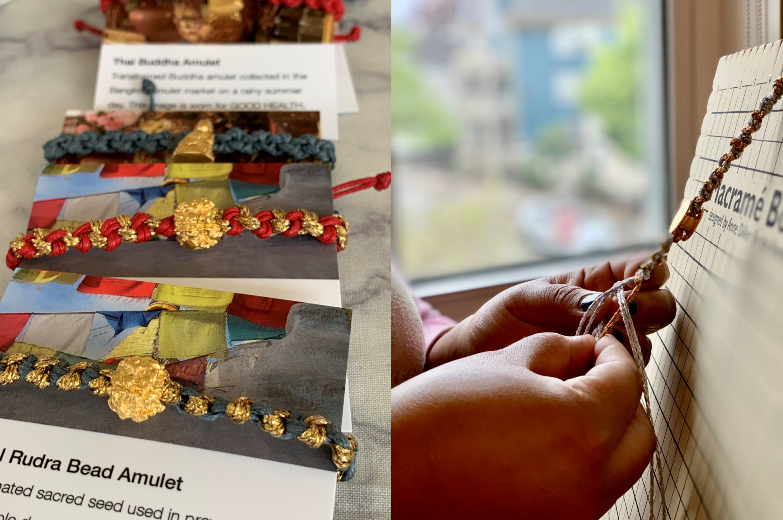Jewelry maker Jessica Ricci started out as a collector of small, interesting objects. While living in Italy, she became fascinated by cultural artifacts other people had tossed out, such as keys, coins, lace, prayer cards, and the like. When she returned home to Rhode Island in 2005, she taught herself how to transform these items into jewelry using wax casting and then started a business to sell her designs. Over the years, though, as her business grew, Jess felt there was something more she needed to do.
“In the back of my mind, I always wanted my business to support a social cause,” she says, “and besides donating jewelry, I was never sure how to get there. Eventually, as more and more social enterprises emerged, I realized that I needed to pivot, in some way, into that model.”
A lucky meeting with Kim Anderson, who is an SEG board member and the founder of Plant City Providence, helped Jess decide the direction she wanted to take. During the meeting, Jess described her desire to create a service-oriented organization, and Kim introduced her to SEG. Jess signed up for SEG’s 2019 Impact Accelerator so she could figure out how to turn her idea into reality.
“I didn’t have this aspect of my business started at all, so without SEG I would not have been able to launch it. Being able to tease out your mission statement and pain points and continuously having to hear yourself tell a roomful of people what you are trying to achieve is a valuable exercise.”
The social enterprise she established, called FOUND, trains and pays women who have been through the Amos House Mother Child Reunification Program to create woven bracelets on their own time as they care for their children. “My mission is to offer meditative and creative in-home work for mothers recovering their lives after incarceration, homelessness, or addiction,” says Jess. “FOUND aims to address the problem women in this circumstance can face: no car, no childcare, barriers to entry, and the need to focus on recovery. The FOUND program offers work they can do that is meditative and creative as they care for their children and center their lives.”
The SEG Network Effect
During the Accelerator, with guidance from SEG staff, workshop instructors, and coaches, Jess built her social venture from the ground up. “I didn’t have this aspect of my business started at all, so without SEG I would not have been able to launch it,” she says. “Being able to tease out your mission statement and pain points and continuously having to hear yourself tell a roomful of people what you are trying to achieve is a valuable exercise. Probably the best advice I got was to ask myself if my product actually solved a problem. What does it actually do to help? That helped me to focus.”
Focusing on that question also helped Jess fine-tune her strategy. “The coaches at SEG helped me to look closely at what the women I am trying to serve have to overcome,” she says. “I thought I would go to Amos House and train them, and we would have scheduled times where they would make these bracelets. But that didn’t address their problem, which was that they really need work they can do at home as they juggle their lives as mothers. This made me rework how I would run a training and how to organize materials to focus on in-home work.”
“Understand your mission. Tell it to strangers and watch their faces for understanding. I think you can see it in people’s eyes if it translates and makes sense.”
Jess launched FOUND by employing three women from the Amos House program and training them to make jewelry. One of them unfortunately suffered a relapse and had to drop out, but two women continue to work with FOUND and are making bracelets and chokers for sale. So far, FOUND has been able to sell 200 bracelets, and Jess has been able to pay each participating woman $800 for their work over the course of about five months. She has plans to diversify the FOUND product line and to increase the number of women participating. She also hopes to hire a sales rep for FOUND once the COVID-19 pandemic passes. The connections Jess made through her experience in SEG’s Impact Accelerator will be there as resources as she develops her social venture.
“SEG introduced me to concepts that I never would have been exposed to,” she says. “It focused my abstract idea and took me through all the steps I needed to in order to turn that need to create “something” to help “someone” into a product that has helped two amazing women pay some of the bills they are buried under. SEG did that.”
Jess now has advice of her own to share with people who want to start a social enterprise. “Understand your mission,” she says. “Tell it to strangers and watch their faces for understanding. I think you can see it in people’s eyes if it translates and makes sense. And all ideas may not be good, but they are all stepping stones.”
She keeps following those stepping stones. “We all get lost,” she says. “We all fall. Everyone deserves a chance. My venture wants to give a chance to a population of women who are no different from you and me but just have had different experiences. The women I work with have not gotten rich, but I hope they feel like the world hasn’t forgotten about them, and that that there are creative avenues for them to explore.”


